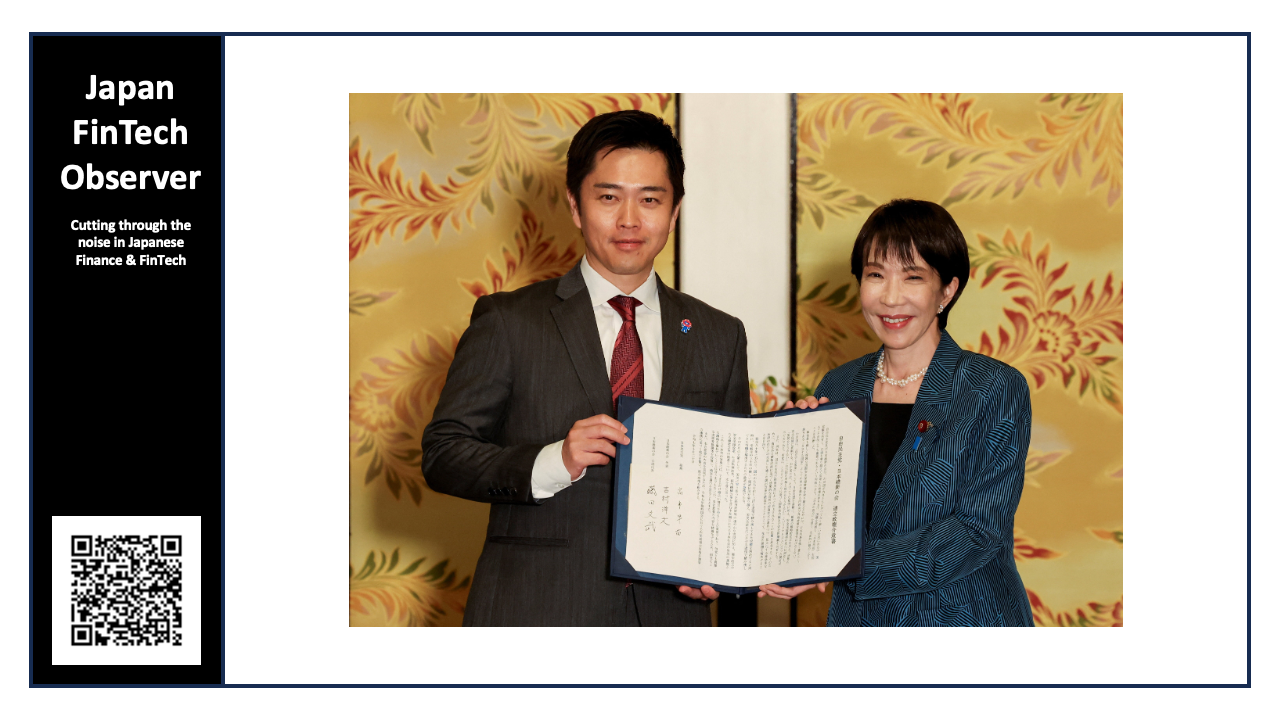The LDP & Japan Innovation Party Coalition Agreement

On October 20, 2025, Japan's Liberal Democratic Party (LDP) and Nippon Ishin no Kai (Japan Innovation Party) signed a comprehensive coalition government agreement to form a stable administration under what would become Japan's first female prime minister, Takaichi Sanae.
Economic and Fiscal Policy
The coalition commits to immediate economic relief measures, including abolishing the provisional gasoline tax rate and providing electricity and gas subsidies through a supplementary budget. They plan to transition to inflation-responsive policies by adjusting income tax deductions and introducing refundable tax credits by year-end 2025. A Government Efficiency Bureau will be established to eliminate ineffective subsidies and tax measures. Notably, they will consider exempting food and beverages from consumption tax for two years, while rejecting the previous administration's cash handout plan.
Social Security Reform
The agreement prioritizes comprehensive healthcare and social insurance reform to reduce burdens on the working generation. Key measures include reviewing pharmaceutical costs, strengthening insurer authority, reforming the medical fee system, and implementing age-independent ability-to-pay principles. The coalition will examine the third-category insured system and consider allowing medical institutions to engage in for-profit activities to stabilize finances.
Constitutional and Governance Changes
The parties will pursue constitutional amendments on Article 9 (national defense), emergency provisions, and establish text drafting councils during the 2025 extraordinary Diet session. They aim to revise the Imperial House Law in 2026 to enable male-line succession through adoption. The agreement also includes creating a sub-capital system for crisis management and legalizing maiden name use while maintaining the family registration system.
Security and Intelligence
Responding to heightened regional tensions, the coalition will accelerate long-range missile development, establish a National Intelligence Agency equal in rank to the National Security Bureau, create an independent Foreign Intelligence Agency by 2027, and develop comprehensive espionage prevention legislation. Self-Defense Forces recruitment and conditions will be improved, with pension systems under consideration.
Population and Immigration
Recognizing population decline as Japan's greatest challenge, they will establish a Population Decline Countermeasures Headquarters and formulate a comprehensive "Population Strategy" by 2026. Foreign national policies will be strengthened with stricter enforcement against rule violations, quantitative management of residents, and enhanced regulations on foreign land acquisition. A Japanese version of CFIUS will be created.
Education and Energy
Free high school education and elementary school lunches will begin in April 2026. The coalition will optimize university numbers, significantly expand scientific research funding, and pursue energy security through nuclear reactor restarts, next-generation reactor development, and renewable energy expansion.
Political Reform
The most contentious issue remains corporate donations—LDP favors disclosure while Ishin wants complete abolition. A coordination body will examine this during President Takaichi's term. Both parties agree to reduce House seats by 10% and reform the electoral system, potentially replacing the current parallel voting system.
This wide-ranging agreement represents a significant political realignment in Japan, combining LDP's traditional governance with Ishin's reform-oriented agenda to address demographic, economic, and security challenges.
The following is the full text, translated into English.
The Liberal Democratic Party and Nippon Ishin no Kai have determined that, amid the unprecedentedly severe situation facing our nation both domestically and internationally, it is of utmost importance to share a common national vision, transcend partisan positions, establish a stable government, overcome national crises, and achieve "Japan's Revival." Believing in "Japan's Underlying Strength," we have decided to cooperate fully.
To overcome the most severe and complex international security environment in the postwar era, we must promote domestic and foreign policies that make the Japanese archipelago strong and prosperous, and advance our path as a proud "independent nation."
As an "independent nation," Japan will support strategic stability in the Far East with the US-Japan alliance as its cornerstone and contribute to global security. In addition to such resolve, Japan requires a perspective based on realism that responds immediately to changes in the security environment: "How do we protect our people?" and "How do we protect Japan's peace and independence?" Both parties share this realism-based view of international politics and security.
Furthermore, both parties share the recognition that people's lives are improved through economic growth. To achieve this, we aim to solve societal issues by promoting effective public-private investment expansion based on responsible proactive fiscal policy, while thoroughly implementing expenditure reform through reviewing the bloated and inefficient government structure.
It is urgent to solve the homework accumulated over the 80 years since the war in shaping the nation, while simultaneously solving the homework accumulated in the process of improving people's lives by overcoming the 30 years of severe economic conditions since the end of the Cold War.
As measures for this purpose, we have reached this agreement on the swift implementation of economic measures close to the people, as well as promoting structural reforms that will form the foundation for Japan's medium- to long-term social development, including constitutional amendment, security reform, social security reform, and governance structure reform.
To realize these policies, it is important to obtain the broadest possible support, and it goes without saying that we will continue sincere discussions with other parties. However, to refine the content of this agreement, we will establish a working-level coordination body between both parties to ensure reliable implementation.
Furthermore, to realize the content of this agreement, we pledge cooperation based on coordination in the Prime Minister nomination election at the 2025 extraordinary Diet session and establish a coalition government.
I. Economic and Fiscal Measures
▽ Enact legislation to abolish the former provisional tax rate on gasoline during the 2025 extraordinary Diet session.
▽ Urgently compile price countermeasures including electricity and gas bill subsidies, and pass a supplementary budget during the 2025 extraordinary Diet session.
▽ Urgently compile and implement comprehensive measures necessary to transition to inflation-responsive economic policy. In particular, compile by the end of 2025 the institutional design for reviewing basic income tax deductions in accordance with inflation progress. Promptly advance institutional design for introducing refundable tax credits and achieve their implementation.
▽ Conduct a comprehensive review of special tax measures and high-value subsidies, abolishing those with low policy effectiveness. Establish a Government Efficiency Bureau (tentative name) as the entity to conduct this work.
▽ Consider legislation with a view to exempting food and beverages from consumption tax for a limited period of 2 years.
▽ The policy of providing ¥40,000 per person to children and adults in non-resident tax households, and ¥20,000 per person to others, shall not be implemented.
II. Social Security Policy
▽ Realize specific institutional designs for medical system reform described in the so-called "Three-Party Agreement on Medical Law" and "Three-Party Agreement on Basic Policy" concluded at the 2025 ordinary Diet session during fiscal 2025, including review of pharmaceutical self-payment burdens including "OTC-like drugs" and thorough ability-to-pay burden reflecting financial income. While promoting overall social security reform, aim to stop and reduce the premium rate increase for the working generation.
▽ Share a sense of crisis about the rapid increase in social security-related expenses and problem awareness about excessive burden increases centered on the working generation. Inherit the agreement on social security reform implemented from the 2025 ordinary Diet session to break through this current situation, and regularly hold a coordination body between both parties on social security reform.
▽ By the end of fiscal 2025, agree on specific frameworks for social security reform items including the following, conduct specific institutional design by the end of fiscal 2026, and implement sequentially:
(1) Promotion of insurance financial soundness measures (institutional responses to reconcile medical benefit costs under inflation with suppression of working generation insurance premium burdens)
(2) Strengthening authority and functions of insurers in the medical and nursing care fields, and strengthening the role of prefectures (①insurer reorganization and consolidation ②construction of a national integrated platform for medical and nursing care insurance systems ③making prefectures the responsible entity for infrastructure development for nursing care insurance services, etc.)
(3) Reform of the Central Social Insurance Medical Council to strengthen hospital functions, strengthen drug discovery functions, reflect patients' voices, and realize data-based institutional design
(4) Realization of truly fair ability-to-pay burden regardless of age for medical out-of-pocket costs
(5) Review of the definition of "elderly" to realize a society where people can continue working regardless of age
(6) Institutional design to sustainably provide regional medical and nursing care services even under population decline
(7) Examination of the proper role of public insurance and utilization of private insurance to protect the core of the universal health insurance system
(8) Strengthening university hospital functions (construction of appropriate salary systems for medical personnel engaged in education, research, and clinical practice, etc.)
(9) Management stabilization and worker treatment improvement for hospitals handling advanced medical functions (fundamental review of medical fee systems)
(10) Review of the third-category insured system considering increased spouse social insurance enrollment rates and lifetime non-marriage rates
(11) Establishment of indicators for cost-effectiveness analysis of medical care
(12) Review of the proper role of medical institutions' for-profit businesses to strengthen revenue structures and stabilize management
(13) Review of the current consumption tax burden on updates to advanced medical equipment and facilities at medical institutions
▽ In light of the severe management conditions of hospitals and nursing care facilities due to recent price increases, implement measures to improve the management conditions of hospitals and nursing care facilities.
III. Imperial Family, Constitutional Amendment, Family System, etc.
▽ Based on the weight of the fact that male-line succession has been maintained without exception since ancient times, and on the premise of not changing the current order of succession, as the first priority for stable imperial succession, aim to revise the Imperial House Law at the 2026 ordinary Diet session with a plan that is "consistent with imperial history and realistic: making adoption, which is not currently permitted for imperial family members, possible, and making male-line males belonging to the imperial lineage imperial family members."
▽ Based on Nippon Ishin no Kai's proposal "21st Century Defense Concept and Constitutional Amendment," establish a text drafting council between both parties regarding Article 9 constitutional amendment. The establishment timing shall be during the 2025 extraordinary Diet session.
▽ To realize constitutional amendment regarding emergency provisions (maintaining Diet functions and emergency ordinances), establish a text drafting council between both parties during the 2025 extraordinary Diet session, and aim to submit a text proposal to the Diet by the end of fiscal 2026.
▽ As soon as possible, permanently establish text drafting committees in the constitutional review committees of both Houses.
▽ Conduct institutional design for systems necessary for constitutional amendment proposals (e.g., organizational laws regarding the organization and jurisdiction of the National Referendum Public Relations Council, and operational laws regarding CM regulations and internet regulations, etc.).
▽ Create a system that gives legal effect to the use of maiden names in all aspects of social life while maintaining the family registration system and the principle of same household registration and same surname. To this end, submit legislation for the legalization of customary use of maiden names to the 2026 ordinary Diet session and aim for its passage.
▽ At the 2026 ordinary Diet session, enact a "Crime of Damaging the National Emblem of Japan" to correct the contradiction of only having a "Crime of Damaging Foreign National Emblems."
IV. Foreign Affairs and Security
▽ Revise the three strategic documents ahead of schedule due to changes in the most severe and complex strategic environment in the postwar era.
▽ From the perspective of cultivating new diplomatic means to build peace in the international community, establish a department for peace mediation in the Ministry of Foreign Affairs during fiscal 2025.
▽ From the perspective of accelerating the development of stand-off defense capabilities to significantly strengthen Japan's deterrence, steadily advance the development of long-range missiles with counterattack capabilities and land deployment sites, while promoting policies for possessing VLS-equipped submarines utilizing next-generation power that can carry long-range missiles and enable long-distance, long-term movement and submerged navigation.
▽ To improve efficiency of Self-Defense Forces operational organizations and strengthen unified command and control of the Joint Operations Command, steadily implement regional integration of the Self-Defense Forces and simplification of intermediate connection points.
▽ From the perspective of strengthening the defense production and technology base, abolish the five categories of the "Operational Guidelines for the Three Principles on Transfer of Defense Equipment and Technology" at the 2026 ordinary Diet session, and promote measures regarding national arsenals and state-owned facilities with private operation for the defense industry.
▽ Share a sense of crisis regarding the serious situation concerning Self-Defense Forces recruitment, and the necessity of measures to fundamentally strengthen the human foundation including treatment improvements, and improve Self-Defense Forces members' pride as Self-Defense Forces personnel. To break through the current situation, consider establishing a pension system for Self-Defense Forces members. Additionally, implement internationalization of current Self-Defense Forces "ranks," "uniform systems," and "occupational categories" by the end of fiscal 2026.
V. Intelligence Policy
▽ Share the recognition that Japan's intelligence functions are fragile and strengthening national intelligence functions is urgent, discuss comprehensive intelligence reform, and implement agreed measures.
▽ At the 2026 ordinary Diet session, upgrade the Cabinet Intelligence and Research Office and the Cabinet Intelligence Director, creating a "National Intelligence Agency" and "National Intelligence Agency Director." To place policy and intelligence departments on equal footing in the security domain, the "National Intelligence Agency" and "National Intelligence Agency Director" shall be equal in rank to the "National Security Bureau" and "National Security Bureau Director."
▽ Developmentally dissolve the current "Cabinet Intelligence Conference" (Cabinet decision matter), and enact legislation to establish a "National Intelligence Conference" at the 2026 ordinary Diet session.
▽ Establish an independent Foreign Intelligence Agency (tentative name) by the end of fiscal 2027.
▽ To systematically train intelligence personnel, establish an Intelligence Community cross-cutting (inter-ministerial) intelligence officer training institution by the end of fiscal 2027.
▽ Begin examination of intelligence and espionage prevention-related legislation (basic law, foreign agent registration law, lobbying disclosure law, etc.) in 2025, promptly draft bills, and enact them.
VI. Energy Policy
▽ Given the increase in electricity demand, proceed with restarting nuclear power plants with safety assurance as the top priority. Additionally, accelerate development of next-generation innovative reactors and fusion reactors. Promote development of renewable energy where Japan has advantages, such as geothermal.
▽ Accelerate domestic marine resource development (energy resources and mineral resources).
VII. Food Security and National Land Policy
▽ Share the recognition that securing stable food supply is indispensable for people's survival, prepare an environment to effectively utilize all rice paddies and fields, and realize large-scale investment in facility-based food production equipment that can withstand harsh climates (so-called plant factories and land-based aquaculture, etc.).
▽ Confirm the importance of preserving the beautiful national land that Japan has nurtured since ancient times, and from the perspective of suppressing environmental destruction and disaster risks from forest logging and inappropriate development, and conducting appropriate land use and maintenance management, implement measures to legally regulate large-scale solar power plants (mega-solar) at the 2026 ordinary Diet session.
VIII. Economic Security Policy
▽ Promote measures to strengthen the resilience of submarine cables in the Southwest Islands.
IX. Population Policy and Foreign National Policy
▽ Based on the recognition that Japan's greatest problem is population decline, establish a Population Decline Countermeasures Headquarters (tentative name) in the government during the 2025 extraordinary Diet session, and examine and implement fundamental and powerful population decline countermeasures including child and childcare policies.
▽ Based on the idea that strict responses to foreign nationals who cannot follow rules and laws are also important for foreign nationals who fit into and contribute to Japanese society, take the following measures:
(1) Strengthen the command tower in the Cabinet and appoint a minister in charge.
(2) Formulate a "Population Strategy" by the end of fiscal 2026 that clearly states numerical targets and basic policies for accepting foreign nationals, including quantitative management of resident foreign nationals from the perspective of friction with society when the foreign national ratio becomes high.
(3) Strengthen responses to illegal acts by foreign nationals and the institutional foundation.
(4) Strengthen responses to misuse, abuse, and exploitation of systems related to foreign nationals.
▽ At the 2026 ordinary Diet session, aim to establish a Committee on Foreign Investment in Japan (Japanese version of CFIUS). Additionally, at the 2026 ordinary Diet session, draft legislation to strengthen regulations on land acquisition by foreign nationals and foreign capital.
X. Education Policy
▽ To implement so-called free high school education from April 2026, reach agreement on remaining issues by the end of October 2025 and finalize the institutional design.
▽ To implement free elementary school lunches from April 2026, organize remaining issues and finalize the institutional design.
▽ Realize significant expansion of childcare support measures, including the reduction of childcare fee burdens in the "Three-Party Agreement" concluded at the 2025 ordinary Diet session.
▽ As per the "Three-Party Agreement" concluded at the 2025 ordinary Diet session, formulate a grand design for high school education reform and realize securing educational opportunities nationwide and improving education quality.
▽ Aim to optimize the number and scale of universities due to population decline.
▽ Significantly expand Grants-in-Aid for Scientific Research to secure sufficient research funds for basic research, which is the foundation of a nation built on science and technology.
XI. Governance Structure Reform
▽ From the perspective of building a backup system for capital crisis management functions and forming capital function dispersion and a multipolar decentralized economic zone, establish a coordination body between both parties during the 2025 extraordinary Diet session, organize the responsibilities and functions of the capital and sub-capital, conduct urgent examination, and pass legislation at the 2026 ordinary Diet session.
XII. Political Reform
▽ Regarding the treatment of corporate and organizational donations, the Liberal Democratic Party has advocated "disclosure rather than prohibition," while Nippon Ishin no Kai has advocated "complete abolition." While sharing the awareness that institutional reform is necessary to eliminate concerns that large donations from specific corporations and organizations might distort policy decision-making, and to pursue a form of political funds trusted by the people, we have not yet reached a final conclusion at this time. Therefore, both parties will establish a coordination body during the 2025 extraordinary Diet session to discuss the proper form of political party fundraising, including donations from corporations and organizations, donations from political organizations, recipient regulations, monetary limit regulations, party business revenue through institutional publications, and disclosure methods. Additionally, a third-party committee will examine these issues, and we will reach a conclusion during President Takaichi's term.
▽ Proceed with examination of a political party law to clarify governance in political parties.
▽ To reduce the number of House of Representatives seats by 10% as a target, submit a member-sponsored bill at the 2025 extraordinary Diet session and aim for its passage.
▽ To establish an electoral system suited to the times, both parties will lead discussions in all venues including the "Council on House of Representatives Electoral System" established in the House Steering Committee, examining options including abolition of the single-seat constituency proportional representation parallel system and introduction of a medium-sized constituency system. To this end, establish a coordination body between both parties during fiscal 2025.
Policies other than those stated above shall be discussed in good faith between both parties.






